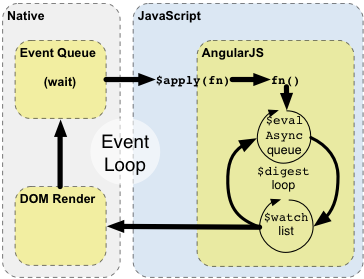Some notes about $watch, $apply, $digest in AngularJS AngularJS 20.07.2015
In addition to storing data, scopes have three important functions that are fundamental to the way data binding works. These functions are called $watch, $apply, and $digest.

$watch
$watch makes up one side of two-way data binding: it enables you to set a callback function to be called whenever the value of a given expression changes. The callback function is often referred to as a watcher. A simple usage of $watch is to update a weather variable every time the user changes city:
$scope.$watch('city', function(value) {
$http.get('/remote/url/').success(function(data){
$scope.weather = data.temp;
})
});
Internally, $watch is a trivial function. Each scope maintains a list of watchers, called $scope.$$watchers.$watch simply adds a new watcher, which includes some internal bookkeeping to keep track of the last computed value of the expression.
$apply
$apply makes up the other half of two-way data binding: it informs AngularJS that something has changed and the values of $watch expressions should be recomputed. You usually won’t have to call $apply yourself, because AngularJS’s built-in directives (such as ngClick) and services (such as $timeout) call $apply for you.
You’re most likely to run into $apply in the context of custom event handlers. When an event occurs, such as a user clicking a button, or an outstanding HTTP request has completed, AngularJS needs to be informed that the model may have changed. Directives like ngClick and ngDblclick call $apply internally for this reason.
// some changes ... $scope.weather = temp; $scope.$apply();
$digest
$digest is the magic glue function that ties together $watch and $apply. You would be hard-pressed to find an example where you need to interface with $digest directly rather than through $watch and ``$apply.
At a high level, $digest evaluates all the $watch expressions in a scope, as well as the scope’s children, and fires the watcher callback on any that have changed. This process may seem simple, but there’s a subtle difficulty: a
watcher can change the scope, which in turn means that there may be other watchers that need to be informed of changes.
Quote
Categories
- Android
- AngularJS
- Databases
- Development
- Django
- iOS
- Java
- JavaScript
- LaTex
- Linux
- Meteor JS
- Python
- Science
Archive ↓
- September 2024
- December 2023
- November 2023
- October 2023
- March 2022
- February 2022
- January 2022
- July 2021
- June 2021
- May 2021
- April 2021
- August 2020
- July 2020
- May 2020
- April 2020
- March 2020
- February 2020
- January 2020
- December 2019
- November 2019
- October 2019
- September 2019
- August 2019
- July 2019
- February 2019
- January 2019
- December 2018
- November 2018
- August 2018
- July 2018
- June 2018
- May 2018
- April 2018
- March 2018
- February 2018
- January 2018
- December 2017
- November 2017
- October 2017
- September 2017
- August 2017
- July 2017
- June 2017
- May 2017
- April 2017
- March 2017
- February 2017
- January 2017
- December 2016
- November 2016
- October 2016
- September 2016
- August 2016
- July 2016
- June 2016
- May 2016
- April 2016
- March 2016
- February 2016
- January 2016
- December 2015
- November 2015
- October 2015
- September 2015
- August 2015
- July 2015
- June 2015
- February 2015
- January 2015
- December 2014
- November 2014
- October 2014
- September 2014
- August 2014
- July 2014
- June 2014
- May 2014
- April 2014
- March 2014
- February 2014
- January 2014
- December 2013
- November 2013
- October 2013